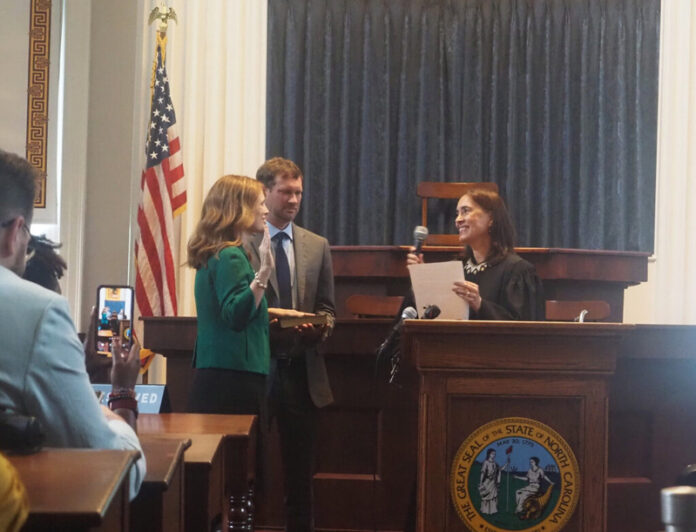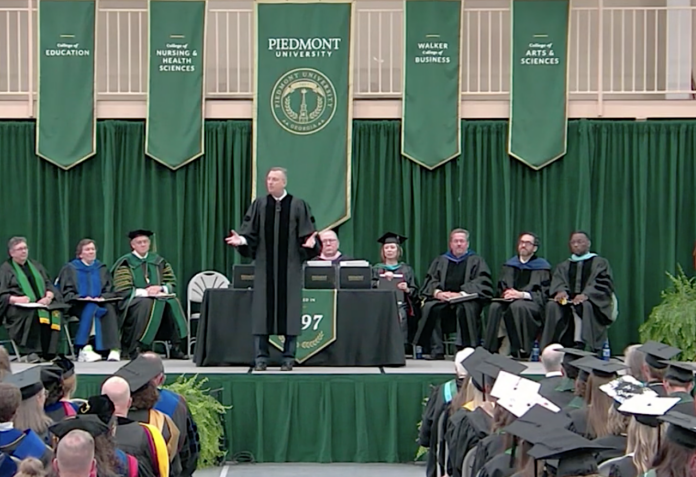WASHINGTON (States Newsroom) — U.S. House Republicans plan to debate and approve the three final pieces of their “big, beautiful bill” in committee this week, including the tax measure, major spending cuts to Medicaid that will change how states run the program and an agriculture bill.
At least $880 billion over the next 10 years would be slashed under the piece of the bill that covers energy and health care, including from Medicaid. Republicans would add new Medicaid work requirements for some able-bodied adults; seek to penalize the dozen states that allow immigrants living in the U.S. without legal status in the program; and require states to more frequently check Medicaid enrollees’ eligibility, among other changes.
An estimate was not yet available for exactly how much that would save in Medicaid spending or how many people enrolled might lose coverage. Earlier projections of various other scenarios by the Congressional Budget Office had placed the numbers of displaced enrollees in the millions, and Democrats predicted the same effect from the newest plan.
House panels have already signed off on eight of the 11 bills that will make up the sweeping reconciliation legislation. And if all goes according to plan, that chamber should approve the entire package before the end of the month.
Debate is expected to begin Tuesday in each of the panels and last hours, possibly into Wednesday. Democrats will offer dozens of amendments seeking to change the bills and highlighting their disagreement with GOP policy goals.
Internal Republican disputes between centrists and far-right lawmakers over numerous tax proposals and funding changes to Medicaid will also likely lead to debate on GOP amendments.
With paper-thin majorities in the House and Senate, nearly every Republican needs to support the overall package for it to move through both chambers and to President Donald Trump.
If Republicans fail to reach agreement during the next couple months, it would put nearly every aspect of their agenda in jeopardy. GOP leaders would also need to negotiate a bipartisan debt limit agreement before the August recess, should the reconciliation package fall apart, since they plan to include debt limit language as well.
GOP divided over Medicaid cuts
Kentucky Republican Rep. Brett Guthrie, chairman of the committee that oversees energy and Medicaid, wrote in a statement last week announcing the markup that his panel’s measure would “end wasteful government spending, unleash American energy and innovation, and strengthen Medicaid for mothers, children, individuals with disabilities, and the elderly.”
But the bill released this weekend might not have support from far-right members in the House and seems to be running into opposition from some GOP senators as well.
Texas Republican Rep. Chip Roy, of the hard right, wrote on social media that he hoped “House & Senate leadership are coming up with a backup plan…. ….. because I’m not here to rack up an additional $20 trillion in debt over 10 years or to subsidize healthy, able-bodied adults, corrupt blue states, and monopoly hospital ceos…”
Missouri Republican Sen. Josh Hawley, who has voiced concern for months about potential cuts to Medicaid, wrote an op-ed published in The New York Times on Monday highly critical of a “contingent of corporatist Republicans” who support lower federal spending on the program.”
“This wing of the party wants Republicans to build our big, beautiful bill around slashing health insurance for the working poor,” Hawley wrote. “But that argument is both morally wrong and politically suicidal.”
The entire House package will be open to amendment if the legislation makes it to the Senate, where several GOP lawmakers are expected to rework or even eliminate entire sections.
Work requirements
The Energy and Commerce Committee’s bill is the one that would cut federal spending by at least $880 billion during the next decade including on Medicaid, the state-federal health program for lower income people.
The legislation would institute work requirements nationwide for able-bodied adults between the ages of 19 and 65, with several exceptions, including for pregnant people, enrollees with certain disabilities or serious medical conditions, and parents of dependent children.
People not exempted from the requirements would need to work, engage in community service, or enroll in an education program for at least 80 hours a month.
A staffer on the panel told reporters during a background briefing Monday that Republicans tried to learn from challenges certain states had in the past when they implemented work requirements.
After discussions with current and former state Medicaid directors, the staffer said the committee wrote a bill that they are confident “states will be able to implement effectively.”
The work requirements take into account various unexpected circumstances, like if someone were to be hit by a bus and unable to complete the 80-hours-per-month requirement on time because they were hospitalized, the staffer said.
“We did try to be very thoughtful about any kind of circumstance that could happen,” they said.
Immigrant coverage, eligibility checks
The Medicaid legislation also seeks to encourage states who include undocumented immigrants in their program to stop doing so or lose some federal funding.
The federal government currently pays 90% of the cost of covering enrollees who are eligible for Medicaid under the 2010 Affordable Care Act expansion. That would decrease to 80% for the expanded population if states choose to keep covering undocumented immigrants.
The committee staffer said this would impact California, Colorado, Connecticut, the District of Columbia, Illinois, Maine, Massachusetts, New Jersey, New York, Oregon, Utah, Vermont and Washington states if they don’t change their policies regarding undocumented immigrants.
Additionally, states would need to check eligibility for all of their Medicaid enrollees every six months, instead of once a year for the expanded population. This likely would lead to some people being kicked out of the program.
Committee staff members were unable to share exactly how each of the Medicaid provisions would affect the federal budget or how many people could lose access to the program if Congress were to implement the legislation as written.
But the nonpartisan Congressional Budget Office wrote in a letter Monday that it estimates the Energy and Commerce Committee met its target of cutting at least $880 billion in spending “over the 2025-2034 period and would not increase on-budget deficits in any year after 2034.”
Staff on the committee said they don’t expect to have the full CBO score before the markup begins Tuesday and didn’t have an estimate for when that information will be out.
Energy and Commerce Committee Ranking Member Frank Pallone, D-N.J., wrote in a statement the GOP bill would lead to millions of people losing access to Medicaid.
“This is not trimming fat from around the edges, it’s cutting to the bone,” Pallone wrote. “The overwhelming majority of the savings in this bill will come from taking health care away from millions of Americans. No where in the bill are they cutting ‘waste, fraud, and abuse’—they’re cutting people’s health care and using that money to give tax breaks to billionaires.”
Repealing clean-energy funds
The Republican proposal would repeal more than a dozen sections of Democrats’ 2022 reconciliation law related to energy and environment programs.
The law, known as the Inflation Reduction Act, included hundreds of billions in tax credits for renewable energy and energy-efficiency measures. It was considered the largest investment by the United States in tackling climate change.
The House bill would repeal sections including the $27 billion Greenhouse Gas Reduction Fund, which helps finance clean-energy projects, and a $40 billion Department of Energy loan program meant to stimulate production of clean-energy infrastructure.
Sections targeting carbon emissions, air pollution, offshore wind transmission, and other programs would also rescind any unspent funds for those purposes appropriated in the Biden-era law.
The measure would allow pipeline builders to pay fees to bypass environmental review. Natural gas pipelines could pay $10 million to access an expedited approval process and liquified natural gas exports could pay $1 million for the Energy Department to deem them “in the public interest.”
Rep. Kathy Castor, the ranking member on the Energy and Commerce Energy Subcommittee, said the proposal would sabotage efforts to drive down prices for consumers.
“Cleaner, cheaper energy for consumers gets left behind,” the Florida Democrat wrote in a statement. “Dismantling our landmark Inflation Reduction Act will kill jobs, hurt businesses, and drive-up Americans’ energy costs.”
Tax cuts
The Ways and Means Committee released its 28-page starter bill late last week and the full 389-page version Monday afternoon, but Republicans on the panel could add to it during the Tuesday markup.
House GOP tax writers propose making permanent the underlying 2017 tax law provisions while temporarily expanding several of them, including the child tax credit and standard deduction.
The child tax credit would increase to $2,500, up from $2,000, until 2028. The refundable amount of the tax credit per child — meaning how much taxpayers could get back — would now reach up to $1,400. Taxpayers claiming the credit would now have to provide a Social Security number, as well as the SSN of a spouse.
The standard deduction for single and married joint filers would temporarily increase until 2029 up to $2,000, depending on filing status.
Trump’s campaign promises, including no tax on tips, also made it into the proposal, though only until 2028. Those claiming the tax break on tips will also need to provide a Social Security number as well as the SSN of their spouse, if married.
Trump’s promise to eliminate taxes on car loan interest, also set to expire in 2028, would not apply to any vehicle that was not finally assembled in the U.S.
Tax writers increased but ultimately left a cap on the amount of state and local taxes, commonly referred to as SALT, that households can deduct, an incredibly contentious issue for lawmakers with constituents in high tax areas like New York and California. GOP lawmakers increased the SALT cap to $30,000, up from $10,000.
That level, however, might not have the support needed among Republicans’ extremely thin majorities and will likely lead to heated debate during markup, or on the floor.
Republicans from higher-tax states have repeatedly said they will not vote for the entire package unless they feel their constituents will benefit from raising the SALT cap.
The dispute has spilled over several times already, including in a statement last week from four New York Republicans, who wrote, “The Speaker and the House Ways and Means Committee unilaterally proposed a flat $30,000 SALT cap — an amount they already knew would fall short of earning our support.”
“It’s not just insulting—it risks derailing President Trump’s One Big Beautiful Bill,” they wrote. “New Yorkers already send far more to Washington than we get back—unlike many so-called ‘low-tax’ states that depend heavily on federal largesse.
“A higher SALT cap isn’t a luxury. It’s a matter of fairness.”
New York Republican Rep. Nick LaLota wrote on social media Monday afternoon: “Still a hell no.”
How much the tax proposal will cost has not yet been released, but government deficit watchdogs estimated a wholesale extension of the 2017 Tax Cuts and Jobs Act, without the enhancements, would cost north of $4 trillion over the next decade.
Erica York, vice president of federal tax policy at the Tax Foundation, said the proposal provides some certainty to individual taxpayers but it also adds complexity in many areas.
“You can clearly see the thinking here was probably just a straight-up extension (of the 2017 law), people wouldn’t feel like they got a tax cut because it’s just continuing. So they had to do something to make it feel like there’s a larger tax cut,” York said.
Ag cuts remain a mystery
The House Agriculture Committee, led by Pennsylvania Republican Glenn ‘GT’ Thompson, hadn’t released its bill as of Monday afternoon but was scheduled to begin the markup on Tuesday evening.
That panel is supposed to cut at least $230 billion in federal spending during the next decade, some of which will likely come from reworking elements of the Supplemental Nutrition Assistance Program, or SNAP.
Committee leaders are also planning to include elements of the much overdue farm bill, though those provisions could run into issues in the Senate if they don’t have a significant impact on federal revenue or spending.
Republicans are using the complex reconciliation process to move the package through Congress with simple majority votes in each chamber, avoiding the Senate’s 60-vote legislative filibuster, which would otherwise require bipartisanship.
Reconciliation measures must address federal revenue, spending, or the debt limit in a way not deemed “merely incidental” by the Senate parliamentarian. That means the GOP proposals must carry some sort of price tag and cannot focus simply on changing federal policy.
Jacob Fischler and Ashley Murray contributed to this report.

















